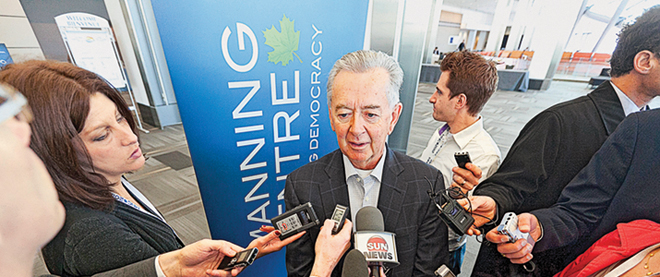Don’t look to Ottawa for the next chapter in conservatism
Paul Wells on the 2012 Manning Networking Conference and the conservatives’ power shift to Alberta and B.C.
Share

A familiar face from Calgary was at Hy’s last Friday, looking a little down.
The 2012 Manning Networking Conference was under way. “Manning,” of course, is Preston Manning, whose Manning Centre for Building Democracy mostly works at building the conservative end of the democratic spectrum. The Networking Conference is the largest annual unofficial gathering of Canadian conservatives. These conservatives are free to be Conservatives or not, depending on mood and inclination. In fact, while we’re at it, people are free to attend even if they are neither Conservatives nor conservatives, as long as they are willing to pay a $349 conference fee, which isn’t unusually high as these things go.
But the event program billed the whole shindig as “A Conservative Family Reunion,” and it was certainly that, with old Reform party stalwarts like Deb Grey and Monte Solberg and Tom Flanagan back in Ottawa to watch a less familiar generation of right-ish thinkers plot and plan for life under a strong, stable, national Conservative majority.
So why the long face? “A decade ago, the Liberals had a majority government. We were f–ked. Nobody knew how we could ever get back,” the visitor from another era said. “Now we have a majority government. The Liberals are f–ked. It’s like there’s nothing left to do.”
I don’t want to oversell this. The fellow’s mood was puzzlement more than despair. “We shot the dog,” he said. “Now what?”
It would be scurrilous and wrong to propose “We Shot the Dog; Now What?” as an alternative slogan for the Manning Networking Conference brochure. My friend at Hy’s is just a pithy epigrammatist. But the mood of bemusement was there too. It showed most clearly at a Saturday morning panel on the future of Canadian conservatism.
Our friend Andrew Coyne got much of the advance buzz, largely because he published his opening remarks as an opinion column in some newspapers. Coyne worries that Stephen Harper’s Conservatives are not particularly conservative because they spend a lot of taxpayer money.
But two other panellists with impeccable conservative credentials said things that also deserve attention. Tom Flanagan was Stephen Harper’s chief of staff before the 2004 election. Ian Brodie had the same job before, and for two years after, the 2006 election. Both had a lot to say about Canada in this, the first full year of a strong, stable, national Conservative majority government.
What they said, each in turn, was: don’t look to Ottawa for the next big chapter in Canadian conservatism. The action over the next year or so will be in Alberta and British Columbia. In both provinces the conservative family is divided, a game Reformers are familiar with.
In Alberta, the super-red Progressive Conservative Premier Alison Redford remains a few points ahead of the more overtly conservative Wildrose party, which is led by another dynamic young woman, Danielle Smith. Flanagan is working on the Wildrose campaign. So is Preston Manning’s former chief of staff, Cliff Fryers. Fryers introduced Smith at an Ottawa speech earlier this month. He said Wildrose appeals to “average Albertans” who feel that “the direction of our province over the past four to six years is entirely inconsistent with its history and values.” But so far, the inconsistent Albertans are keeping Redford’s PCs five points ahead of Wildrose’s average Albertans.
If most federal Conservatives seem to be on the side of Smith’s insurgency in Alberta, most of their neighbours to the west seem to be on the side of Christy Clark and the profoundly incumbent B.C. Liberals. A few are on the payroll. Her chief of staff is Ken Boessenkool, who used to work for Harper and Stockwell Day. Another key staffer is former Canadian Alliance pollster Dimitri Pantazopolous. Clark’s new communications director is Sarah McIntyre, fresh from a stint in the Harper press shop. The heads of the Manning-Harper movement’s B.C. retiree wing, Jay Hill and Chuck Strahl, are backing Clark from the sidelines.
There may even be a few federal Liberals supporting Clark, who is said to have been one in a past life, but she is careful to give little evidence of that if it is so.
Meanwhile, poor John Cummins of the B.C. Conservative Party has Hamish Marshall, who does communications work for the oil sands lobby and for a bunch of federal MPs, and, well, himself. “John Cummins. One of the old Reformers,” Flanagan told the Manning Conference. “Bit of a peculiar duck, but I always liked John.”
Seeking some thread to explain so many federal Conservatives’ simultaneous support for Clark, Smith and Harper, we might say the party’s heart still lies to the right of its brain, but that the brain functions. Alberta’s Redford is vulnerable to an attack from her right, so a lot of federal Tories see a reason to back Smith. B.C.’s Clark is vulnerable on the left, so worth defending. Harper keeps winning, so he faces no meaningful opposition.
He still guards his right flank. MPs elected in 2006 are, since January, eligible for pensions. Many are noticing they’re still not in cabinet. They have less to lose than they once did. For the first time, Harper has been selling his own government’s actions as “major” and “transformational.” It’s his own caucus he seeks to persuade. He does not intend to be the next dead dog.